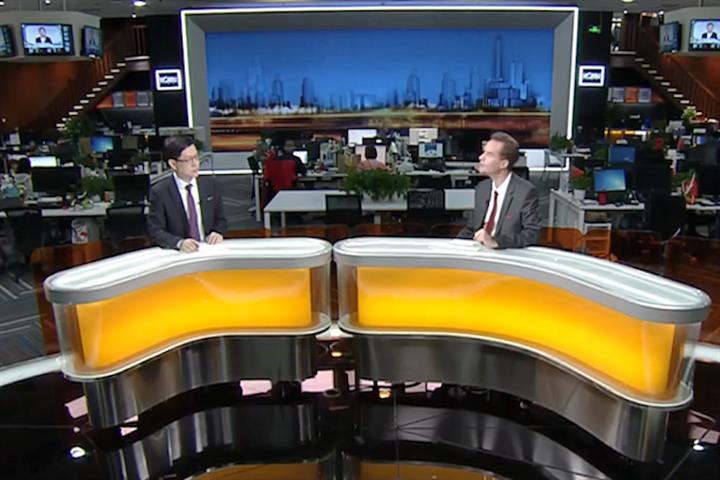 Budweiser APAC Will Continue to Invest in China, CEO Says
Budweiser APAC Will Continue to Invest in China, CEO Says(Yicai Global) Oct. 28 -- China’s economy is very resilient and the business outlook is very promising, the chief executive officer of Budweiser Brewing Group APAC, the largest beer company in the Asia-Pacific region, said in a recent interview with the editor-in-chief of Yicai Global.
Budweiser APAC will continue to invest in China, and stick to its premium market-oriented, commercial expansion and digitization strategies, Jan Craps, who is also co-chair of the Hong Kong-based company, said to Yang Yudong.
China is an important strategic market for Budweiser APAC. Last year, the firm’s China sales jumped 9.3 percent from the previous year and its revenue per hundred liters soared 7.9 percent. And it logged double-digit growth in China’s ultra-premium beer market.
Excerpts from the interview are given below:
Yang Yudong: The Chinese beer market has seen a number of changes over the last year, including more of a focus on the premium market than on sales volume. What measures is Budweiser taking to maintain its growth advantage?
Jan Craps: We started focusing on the premium segment more than a decade ago. We have a very complete portfolio of brands, including high-quality ones. As a result, we are now leading the premium market both in China and in Asia.
We partner very closely with our wholesale partners. They are very strong at building brands in this industry. We also have a team who are very passionate about innovation and high-quality products. They help us to get established in the market. So we are very optimistic about the future growth of the premium segment in China.
YY: Budweiser APAC's Wuhan brewery is the world's first carbon-neutral brewery, and the Jinzhou brewery will follow before the end of the year. How has Budweiser APAC become a leader in environmental, social and governance aspects?
JC: ESG is really a big strategic priority for us. We cannot do this alone, but together with our supply chain partners and together with our many different stakeholders. We identified our priorities for ESG as eight different priorities when we did the initial public offering. To brew beer, you need to use water, you use energy and ingredients, and you put it in packaging. So our four sustainability priorities have to do with these four domains.
Apart from that, we also focus on entrepreneurship, on ethics, on smart drinking, and on diversity and inclusion. Let me give you two examples. As you said before, we were able to create the first carbon neutral brewery in China. To be able to do that, we had to change our boilers into biomass boilers. We upgraded all our vehicles to electric autos. We purchased renewable electricity. So we had to do a lot of different things to enable the brewery to become carbon neutral.
Another example is that we also focus on water usage. Our Nanning brewery in the Guangxi Zhuang Autonomous Region is actually a world leader among any brewery in our network. And for sure, it is the first one in China too. It uses only 1.19 liters of water to brew 1 liter of beer. This really is a new benchmark in the Chinese beer industry.
YY: Sustainability can bring some hidden costs to production. How does Budweiser APAC strike a balance between cost and profit?
JC: I think it's a good question because you are right. It is very counter intuitive, but for us, sustainability can go hand in hand with cost improvements. We just need to be very creative to find new ways of realizing both.
In our Foshan brewery in southern Guangdong province, we were already using solar panels for many years. But we had an issue with the solar power we generated, because we could not always use it at the right moment when we were brewing beer.
So we worked together with 100 + Accelerator to find an innovation company in China. They came up with the idea to use retired vehicle batteries to store the solar energy of the panels and they put them together in one container for us. It actually reduces our electricity costs. We can also use them to charge the electric vehicles we use in Foshan, and this way we have a whole closed-loop system of reusable electricity.Last summer, Budweiser APAC received its first green loan of USD500 million. This means a lower interest rate on the loan if we meet our 2025 sustainability goals, otherwise, the interest rate will go up.
YY: How is Budweiser helping agricultural workers revitalize rural areas?
JC: For instance, we work in eastern Jiangsu province with local barley farmers. We have started a movement to localize the production of barley used to brew beer. We work with local farmers, supporting them with agricultural techniques and committing to the purchase of their barley. Last year we bought 30,000 tons of barley from more than 4,000 farmers.
Another example, in 2020 when Covid-19 broke out in southeastern Fujian province, there was a big issue with the lychee farmers. So our team in Fujian invented a new beer recipe, and they launched a lychee-flavored beer.
Editor: Kim Taylor